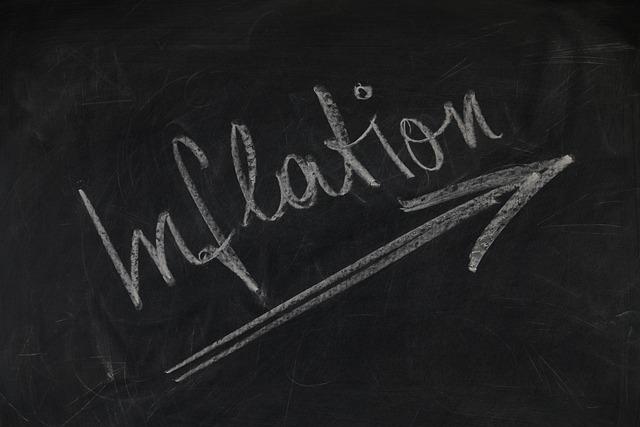financial Progress Projections and Challenges for Poland
Poland’s financial panorama is at present characterised by a gradual however cautious development trajectory. In accordance with current forecasts, the nation’s GDP is anticipated to increase by roughly 3.5% over the following 12 months, pushed primarily by sturdy home consumption and international funding. Key sectors contributing to this development embody manufacturing, data expertise, and renewable power. nonetheless, challenges persist, posing potential roadblocks to sustained development:
Labor Market Constraints: A rising scarcity of expert labor impacts productiveness and innovation.Inflationary Pressures: Rising power costs and provide chain disruptions contribute to elevated inflation, impacting shopper buying energy.Geopolitical Dangers: Tensions in Japanese Europe create uncertainty for international traders.
The federal government’s response to those challenges will likely be pivotal in shaping the longer term financial panorama. Implementing reforms in schooling and workforce progress can assist tackle labor market points, whereas proactive measures to stabilize inflation are important for safeguarding customers. Under is a quick overview of goal financial indicators for the approaching years:
Indicator2024 Target2025 TargetGDP development Rate3.5percent3.8percentInflation Rate2.5percent2.2percentUnemployment Rate4.5percent4.2%
Fiscal coverage and Structural Reforms: Navigating the Put up-pandemic Panorama

The highway to restoration within the aftermath of the pandemic presents each challenges and alternatives for fiscal coverage in Poland. Focused fiscal interventions have performed an important position in mitigating the financial fallout. The Polish authorities, working carefully with worldwide our bodies, has applied measures akin to direct help for companies, enhanced unemployment advantages, and focused investments in healthcare. These initiatives are important for not solely addressing quick financial hardships but in addition for laying the groundwork for sustainable restoration. Making certain that these insurance policies are versatile and attentive to altering financial circumstances will likely be paramount within the upcoming years.
In tandem with fiscal measures, structural reforms are important for bolstering long-term financial resilience. Emphasis ought to be positioned on areas akin to labor market adaptability,digital change,and inexperienced power initiatives. By aligning structural reforms with fiscal methods, Poland can create a extra dynamic financial system able to withstanding future shocks. The combination of public-private partnerships may additional improve the implementation of those reforms, resulting in a extra progressive and aggressive panorama. The mixture of those methods not solely promotes development but in addition goals at enhancing social welfare and fairness throughout the nation.
Inflation Tendencies and Financial Coverage Responses in Poland

Poland has skilled notable fluctuations in inflation charges over the previous few years, considerably influenced by exterior and home elements. The pandemic initially subdued costs, however because the financial system started to rebound, inflation surged. By mid-2023, inflation charges climbed significantly, pushed by escalating power prices and provide chain disruptions. Key contributors to this development embody:
Rising Shopper Demand: Put up-pandemic restoration result in elevated spending.Vitality Costs: World oil and gasoline value will increase have had a direct affect.provide Chain Points: Ongoing logistical challenges have constrained provide.
In response, the Nationwide Financial institution of Poland has adopted a sequence of financial coverage measures aimed toward stabilizing costs and fostering financial development. Rate of interest changes have been central to this method, with the financial institution elevating charges a number of instances all through 2023 to fight inflationary pressures. The financial institution’s technique additionally consists of:
Inflation Focusing on: Sustaining a versatile method to realize goal inflation charges.market Monitoring: Shut scrutiny of financial indicators to preemptively tackle potential points.Communication methods: Clear messaging to take care of public confidence in financial coverage.YearInflation Charge (%)Curiosity Charge (%)20212.80.1020226.81.50202312.56.00
Strengthening Monetary Stability: Suggestions from the IMF

The Worldwide Financial Fund has outlined a number of key suggestions aimed toward bolstering the monetary stability of Poland, specializing in enhancing regulatory frameworks and making certain the resilience of monetary establishments. One main suggestion is to strengthen the oversight mechanisms of the banking sector, making certain that capital necessities are usually up to date to replicate financial fluctuations. Moreover, the IMF emphasizes the necessity for improved transparency and reporting requirements, which may foster larger investor confidence and mitigate dangers related to monetary opacity.
Furthermore, the Fund advocates for the institution of a extra strong system for stress testing banks and monetary establishments, which is able to assist in figuring out vulnerabilities early on. Different suggestions embody:
Encouraging diversification of funding sources for banks to cut back reliance on risky markets.Enhancing cross-border collaboration amongst regulatory our bodies to deal with potential contagion dangers.Selling monetary literacy amongst customers to encourage knowledgeable monetary decision-making.
Implementing these measures can considerably contribute to Poland’s total financial resilience and stability, enabling it to navigate potential international monetary shocks extra successfully.
Labor Market Dynamics: Addressing Abilities mismatches and employment Charges

The dynamics of the labor market within the Republic of Poland have been considerably influenced by evolving financial circumstances and demographic shifts. One of many urgent challenges dealing with employers is a abilities mismatch, the place the {qualifications} of job seekers don’t align with the wants of the industries. This phenomenon has led to persistent employment gaps in sectors which can be important for the nation’s financial development, akin to expertise, engineering, and healthcare. To successfully tackle this concern, a multi-faceted method involving schooling and coaching reforms, in addition to collaborative efforts between governmental our bodies and personal sector stakeholders, is crucial.
In response to the talents mismatch, numerous initiatives have been launched to reinforce employability and align workforce capabilities with market calls for. These embody:
Upskilling Applications: Tailor-made programs and workshops that equip employees with the most recent abilities in high-demand sectors.public-Personal Partnerships: Collaborations between academic establishments and companies to design curricula that meet trade requirements.Profession Steering Companies: Enhanced help for job seekers to assist them navigate the employment panorama, hones their abilities, and perceive market wants.
Furthermore,employment charges have proven a optimistic development,highlighting the significance of adaptability throughout the workforce. A comparative evaluation of present employment statistics reveals:
YearEmployment Charge (%)Unemployment Charge (%)202056.56.2202157.85.9202258.35.5
as these methods unfold, it’s clear that addressing the talents mismatch whereas fostering a resilient labor market will likely be pivotal in sustaining Poland’s long-term financial stability and development.
The Function of Overseas Funding in Polands Financial Future

Overseas funding performs a pivotal position in propelling Poland’s financial panorama in direction of a sustainable and dynamic future. Because the nation continues its transition from a post-communist financial system to a vibrant market financial system,attracting worldwide capital has grow to be paramount. Overseas Direct funding (FDI) particularly acts as a catalyst, enhancing productiveness, fostering innovation, and creating job alternatives. Key sectors benefiting from such inflow embody:
Manufacturing: Leveraging superior applied sciences and methodologies.Data Expertise: Enabling the event of a strong digital financial system.Renewable Vitality: Aligning with international sustainability targets.
Furthermore, Poland’s strategic location inside Europe positions it as a gateway for international enterprises trying to increase throughout the continent. The federal government’s favorable insurance policies, improved infrastructure, and expert workforce have additional enhanced the attractiveness of the Polish market. A current evaluation highlights the importance of FDI with respect to numerous financial indicators:
IndicatorImpactGDP Progress Charge+4.5percentEmployment Charge+2.1 Million JobsExport Progress+8% Yearly
Ultimate Ideas
the Worldwide Financial Fund’s current evaluation of the Republic of Poland sheds gentle on the nation’s strong financial framework whereas addressing important challenges on the horizon. As Poland continues to navigate a fancy international panorama marked by financial uncertainty and geopolitical tensions, the insights from the IMF spotlight the significance of prudent fiscal insurance policies and strategic reforms. The emphasis on sustainable development, resilience to exterior shocks, and an inclusive financial technique will likely be paramount for Poland because it strives to bolster its place throughout the European Union and on the worldwide stage. As stakeholders and policymakers digest these findings, the trail forward would require cautious balancing of ambitions with pragmatic measures to make sure long-term stability and prosperity for all residents.
Source link : https://europ.info/2025/02/23/poland/republic-of-poland-selected-issues-international-monetary-fund/
Creator : EURO-NEWS
Publish date : 2025-02-23 18:35:00
Copyright for syndicated content material belongs to the linked Source.


